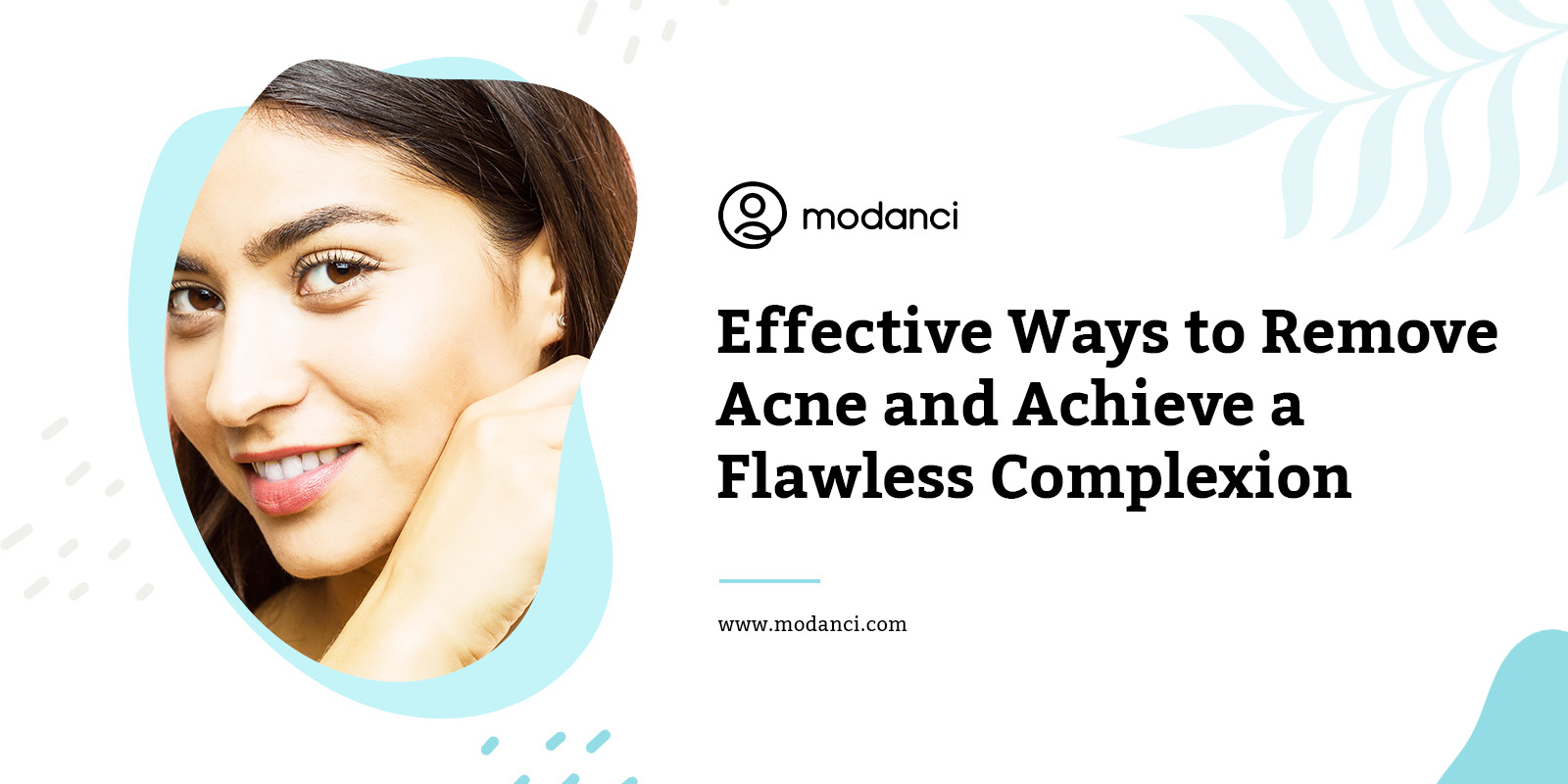We’ve all experienced the frustration of waking up just days before an important event, like a date or a wedding, only to discover new blemishes on our skin. It’s undoubtedly disheartening because acne is the last thing we want to deal with during such occasions. However, even though maintaining clear skin requires consistent care, there are effective measures you can take to improve your skin’s appearance quickly.
In this article, we’ll guide you through the products and techniques that can help clear up your skin and achieve a flawless complexion within a week. A flawless complexion refers to the natural state of your skin, free from tanning or imperfections. It is not limited to a specific skin tone but rather focuses on enhancing your inherent beauty by addressing blemishes and acne. The goal is to reveal your skin’s true radiance and achieve a clear, smooth, and blemish-free appearance.
Additionally, we’ll provide tips on long-term skincare to prevent future blemishes. So, let’s dive right in and build a Skincare regime!
Choosing Products
To swiftly achieve clearer skin, it is advisable to purchase a cleanser, toner, exfoliator, and moisturiser that cater to your specific skin type. When seeking solutions that dont have any side effects, choosing natural or ayurvedic products is recommended.
Begin by identifying your skin type and then seek products specifically formulated to address your concerns (suggested recommendations provided below). To establish a rapid and effective skincare routine for achieving clearer skin, you will require the following products:
1. Cleanser
When it comes to selecting a mild cleanser, consider the following options based on your skin type:
- If you have oily or combination skin, opt for a lightweight, oil-free cleanser that won’t contribute to excess oiliness.
- For dry skin, choose a nourishing face wash that provides moisturising properties to prevent further dryness.
- For sensitive or acne-prone skin, look for non-comedogenic cleansers that are free of ingredients known to clog pores and are specifically formulated to be gentle on the skin.
2. Exfoliant
- To cater to sensitive, acne-prone, or dry skin types, opting for a mild natural exfoliant is recommended and avoid using face scrubs.
- On the other hand, for oily, combination, or normal skin, you have the flexibility to choose either a natural exfoliant or an exfoliating facial scrub, as both options are suitable for these skin types.
This can be changed to natural remedies if Modanci does not sell Exfoliant
3. Toner
- Using an alcohol-free toner is highly recommended for all skin types, but especially if you have dry, sensitive, or acne-prone skin.
- Alcohol-based toners can be harsh and may strip the skin of its natural oils, leading to further dryness or irritation. By opting for an alcohol-free toner, you can maintain your skin’s moisture balance and minimize the risk of aggravating any existing skin concerns.
- For oily and combination skin, consider using an astringent on areas prone to oiliness and a milder, alcohol-free toner on drier areas.
We can mention natural or DIY options like Rose Water if Modanci does not sell Toner
4. Moisturiser
- If you have oily, combination, sensitive, or acne-prone skin, opting for a lightweight moisturiser or gel that is free of oil is recommended.
- If you have dry skin, it is best to choose a rich facial cream, lotion, or body butter.
Product plugin, we can list the types of products offered by modanci e.g. if Modanci offers Body Butter, or Body Yogurt, or Lotion etc that can be mentioned here.
Irrespective of your skin type, it is important to select a moisturiser that has a minimum SPF of 30 to safeguard your skin against sun damage.
Using Products
1. Cleansing
To commence your skincare routine, begin by cleansing your face. Start by wetting your face with warm water (not hot), then dispense an appropriate amount of cleanser into your hands. Rub your hands together until the cleanser produces a slight lather.
Next, apply gentle pressure and use small, circular motions to massage the cleanser onto your face for approximately one minute.
Ensure that the cleanser is evenly spread across your face, and then rinse your face thoroughly with warm water. It is advisable to avoid using hot water as it can strip your skin of its natural oils and result in dehydration.
2. Exfoliating
Incorporate exfoliation into your skincare routine by washing your face and exfoliating 1-2 times per week. Exfoliators effectively eliminate dead skin cells, resulting in smoother skin and clearer pores. To exfoliate, wet your skin, then apply the product using your hands, gently rubbing in small circular motions for approximately 30 seconds. Rinse your face thoroughly with warm water to remove any residue.
If you have an exfoliating face wash, you can replace your regular cleanser with it 1-2 times per week. It’s important not to overdo exfoliation, as it can potentially irritate and dehydrate your skin.
For daily exfoliation, consider using a physical exfoliator such as a scrub or loofah during your shower routine. Massage your face with the exfoliator once the heat has opened up your facial pores. Afterwards, you’ll notice a noticeable improvement in the smoothness of your skin.
Remember to be gentle while exfoliating and to listen to your skin’s needs. Adjust the frequency and intensity of exfoliation based on your skin’s sensitivity and response.
3. Using Toner
After exfoliating or cleansing your face (on days without exfoliation), it is recommended to incorporate a toner into your skincare routine. A high-quality toner can provide additional cleansing and help restore your skin’s natural pH balance. It aids in minimising the appearance of pores, reducing redness, and combating dry patches.
To apply, take a few drops of toner on a cotton pad or ball and gently swipe it across your entire face.
4. Moisturising
To maximise the effectiveness of your moisturiser, gently massage a thin layer of moisturiser into your skin when it is still slightly damp after cleansing and toning.
For those with oily skin, opt for a lightweight, non-comedogenic moisturiser. Skipping this step may cause your skin to produce excess oil in an attempt to compensate for the lack of moisture.
On the other hand, if you have dry skin, seek out moisturisers with richer and thicker formulations, like lotions or Body Butter. These formulations provide the necessary hydration for your skin type.
Consider using a lightweight, thin moisturiser during the daytime and in warmer months while reserving thicker formulas for nighttime and colder seasons to ensure optimal moisturisation. If you are going out in the sun, it is essential to apply a moisturiser that includes sun protection factor (SPF), even if your skin tends to be oily.
To achieve visibly clearer skin in just one week, adhere to the following practices:
- Cleanse your face twice daily: To maximise the effectiveness of your cleansing routine, perform it twice a day—once in the morning and again before bed. This increases the frequency of cleansing and helps maintain progress by preventing buildup overnight.
- Maintain cleanliness and moisturisation: Ensure that your face remains clean and moisturised throughout the day. If you sweat, make sure to wash your face afterwards. If your skin feels tight or dry, reapply moisturiser to keep it hydrated.
- Minimise touching your face: Limit touching your face as much as possible, and always wash your hands before doing so. Touching your face can transfer oil and bacteria, which may lead to new breakouts and blemishes.
- Protect your skin from the sun: When it’s hot outside, make sure to apply sunscreen with a minimum SPF of 15 on top of your regular moisturiser. This will shield your skin from harmful UV rays and prevent potential damage.
But it is not enough to merely nourish your skin from the outside. According to Ayurveda, any health issue must be tackled holistically. So let us look into some lifestyle changes that can help us achieve flawless and acne-free skin.
Lifestyle Changes
1. Stress and Sleep
Heightened and prolonged stress can increase skin sensitivity and trigger uncontrollable breakouts. To address this, allocate time every day to engage in activities you enjoy or practice meditation to clear your mind. Simplify your to-do list and aim for at least 8 hours of sleep each night.
Obtaining quality sleep promotes effective cell turnover in your facial skin, resulting in a fresh appearance each morning. While the benefits of reducing stress may take longer than a week to become noticeable, it contributes to long-term skin health. Moreover, maintaining low stress levels enhances the effectiveness of other acne-fighting products and treatments.
2. Smoking and Alcohol Consumption
To enhance the health and appearance of your skin, it is advisable to cease smoking and reduce alcohol consumption. Smoking has numerous adverse effects on the skin, leading to a paler, older, and wrinkled appearance. It also impairs the skin’s ability to recover from injuries or breakouts.
Similarly, alcohol is dehydrating and can increase skin sensitivity. By reducing alcohol intake and quitting smoking, you can promote a radiant and resilient complexion while benefiting your lungs and liver.
3. Diet
Maintaining a lean and nutritious diet while staying well-hydrated is essential for promoting clear and healthy skin. Proper digestion plays a crucial role in improving metabolism, leading to pure blood circulation, which, in turn, contributes to acne-free skin. The correlation between water consumption and skin health is significant. It is recommended to aim for a daily intake of 11.5 cups (2.7 litres) of fluids for women and 15.5 cups (3.7 litres) for men to ensure proper hydration and support the well-being of your skin.
When incorporating fats into your diet, prioritise sources like fish oil (or fish oil supplements) and fats derived from nuts, seeds, and vegetables like olive oil or avocados. Conversely, avoiding unhealthy fats and processed carbohydrates is advisable, as they may have adverse effects on your skin.
Natural Home Remedies
1. Coconut and Sugar Exfoliator
Make your own sugar-based exfoliator at home using simple ingredients. Mix 1 cup (200 g) of sugar with ½ cup (118 mL) of coconut oil. You can choose brown sugar for a gentle scrub, regular granulated sugar for a slightly coarser texture, or organic sugar for a more intense exfoliation.
To use the scrub, dampen your face with water and gently massage the mixture in circular motions on each cheek for about a minute.
Coconut oil is not only rich in Vitamin E for skin health but also has natural antimicrobial properties, leaving your skin feeling clean, fresh, and soft after exfoliation.
2. Lemon Toner
To replace your toner, use lemon juice as a natural option.
- Extract juice from a lemon and apply it to a cotton ball.
- Gently rub the juice onto your face like a toner.
If your skin is sensitive or dry,
- Dilute the lemon juice with water.
- Leave it on for a few minutes, then rinse with warm water and pat dry.
- Avoid contact with your eyes or any cuts, as it can cause a burning sensation.
Lemon juice helps remove leftover dirt, has antimicrobial properties, Vitamin C for fighting breakouts, and astringents and acids for chemical exfoliation. Apple cider vinegar can also be used as an alternative.
Conclusion
Acne is a wide-ranging skin condition that includes various types, each influenced by different internal and external factors. It is crucial to identify your specific type of acne to understand its underlying causes and establish an appropriate skincare routine. Neglecting proper care can lead to facial pimples that may leave long-lasting scars and cause emotional distress.
It’s important to remember that consistency is key in skincare. At Modanci, we assess your unique condition and create a personalised Ayurvedic skincare regimen tailored to address your specific needs and concerns.
FAQs
1. What are some common causes of acne, and how can it be prevented?
Acne, a common skin disorder of the pilosebaceous unit, can be triggered by various factors. These include hormonal changes during puberty or early pregnancy, fluctuations in estrogen and progesterone levels, genetic skin disorders, polycystic ovarian syndrome in women, use of comedogenic skincare products, consumption of oily or high-sugar foods, stress, overexposure to heat and sun, skin diseases affecting the skin barrier, poor hygiene, and certain medications like lithium, androgenic steroids, and corticosteroids.
To prevent acne scarring, it’s important to reduce inflammation with antibacterial and anti-inflammatory herbs or medications, avoid picking or popping pimples, seek timely medical treatment, protect the skin from the sun with sunscreen, and allow acne to heal naturally without picking at scabs.
2. How can diet and lifestyle factors affect acne and complexion?
An unbalanced and unhealthy diet, inadequate sleep, and excessive alcohol consumption can have detrimental effects on your overall health, and these effects often manifest on your skin in the form of blemishes, acne, or other issues. Conversely, adopting a nutritious diet and maintaining a healthy lifestyle can positively impact your skin, resulting in a vibrant and radiant complexion.
3. What are some effective treatments for acne, both over-the-counter and prescription?
Many skin issues and cases of acne can be effectively addressed using natural home remedies in combination with over-the-counter solutions. However, in serious and chronic cases, it is advisable to seek guidance from an Ayurvedic physician for personalised prescription treatments and medications. Consulting a professional ensures appropriate and tailored care for optimal results.
4. Can natural or at-home remedies be effective for treating acne?
Natural remedies are indeed effective and often come without side effects. Ayurveda, in particular, recommends remedies derived from natural ingredients. However, it can be challenging to find certain herbs and plants readily available in their natural form nowadays. In such cases, opting for Ayurvedic products that are crafted from these natural ingredients can be a viable alternative. These products offer the benefits of traditional remedies while ensuring accessibility and convenience.
Read More:
- Saying Goodbye to Acne Marks: Tips and Skincare Treatments That Work
- How to Remove Acne Scars and Reveal Radiant Skin
- Acne vs Pimples: What’s the Difference and How to Treat Them
- Clear Skin Ahead: Expert Tips and Tricks to Remove Acne from Your Face
- Acne Marks vs Scars: Understanding the Differences and How to Treat Them




